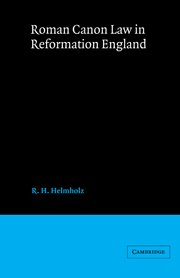Book contents
- Frontmatter
- Contents
- Preface
- List of abbreviations
- Table of statutes
- Table of cases
- 1 THE MEDIEVAL INHERITANCE
- 2 THE FORTUNES OF ECCLESIASTICAL JURISDICTION
- 3 DEVELOPMENTS IN LAW AND LEGAL PRACTICE
- 4 THE LITERATURE OF CIVILIAN PRACTICE
- 5 THE CIVILIANS AND ENGLISH COMMON LAW
- Appendix 1 Manuscript copies of Clerke's Praxis
- Appendix 2 Ecclesiastical reports, 1580–1640
- Index
4 - THE LITERATURE OF CIVILIAN PRACTICE
Published online by Cambridge University Press: 24 November 2009
- Frontmatter
- Contents
- Preface
- List of abbreviations
- Table of statutes
- Table of cases
- 1 THE MEDIEVAL INHERITANCE
- 2 THE FORTUNES OF ECCLESIASTICAL JURISDICTION
- 3 DEVELOPMENTS IN LAW AND LEGAL PRACTICE
- 4 THE LITERATURE OF CIVILIAN PRACTICE
- 5 THE CIVILIANS AND ENGLISH COMMON LAW
- Appendix 1 Manuscript copies of Clerke's Praxis
- Appendix 2 Ecclesiastical reports, 1580–1640
- Index
Summary
No better window on the internal history of the Roman canon law after the Reformation exists than that afforded by the ‘working literature’ which English civilians produced for their own law practice. This literature reveals to the interested observer what points were debatable and what thoughts were thinkable among the men who made their careers in the ecclesiastical courts. It shows what authorities counted with them, and it demonstrates how they fashioned legal and factual arguments from those authorities. At their best, the works written by English ecclesiastical lawyers show which points of law were decisive in the litigation the observer finds so blankly recorded in the act books. Even at their worst, they reveal something about the intellectual resources the civilians had at their disposal.
‘Working literature’ excludes by definition all writing intended for polemical purposes or designed to reach a wider audience than that of practising lawyers. The English civilians were quite capable of writing for those to whom Panormitanus or Mynsinger were only names. John Cowell's Interpreter (1607) or William Fulbecke's Paralleles (1618) are familiar works to students of Stuart England. General treatments like Robert Wiseman's Law of Laws (1657) or Arthur Duck's De usu et authoritate iuris civilis (1653) are known to some. These works, meant to publicize the virtues of the civil law to an English audience largely ignorant of and indifferent to those virtues, are not the subject of this chapter. The works described here have little to say about matters of principle, and less about great issues of political thought.
- Type
- Chapter
- Information
- Roman Canon Law in Reformation England , pp. 121 - 157Publisher: Cambridge University PressPrint publication year: 1990

